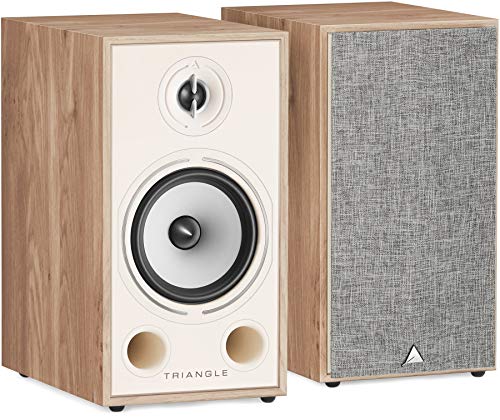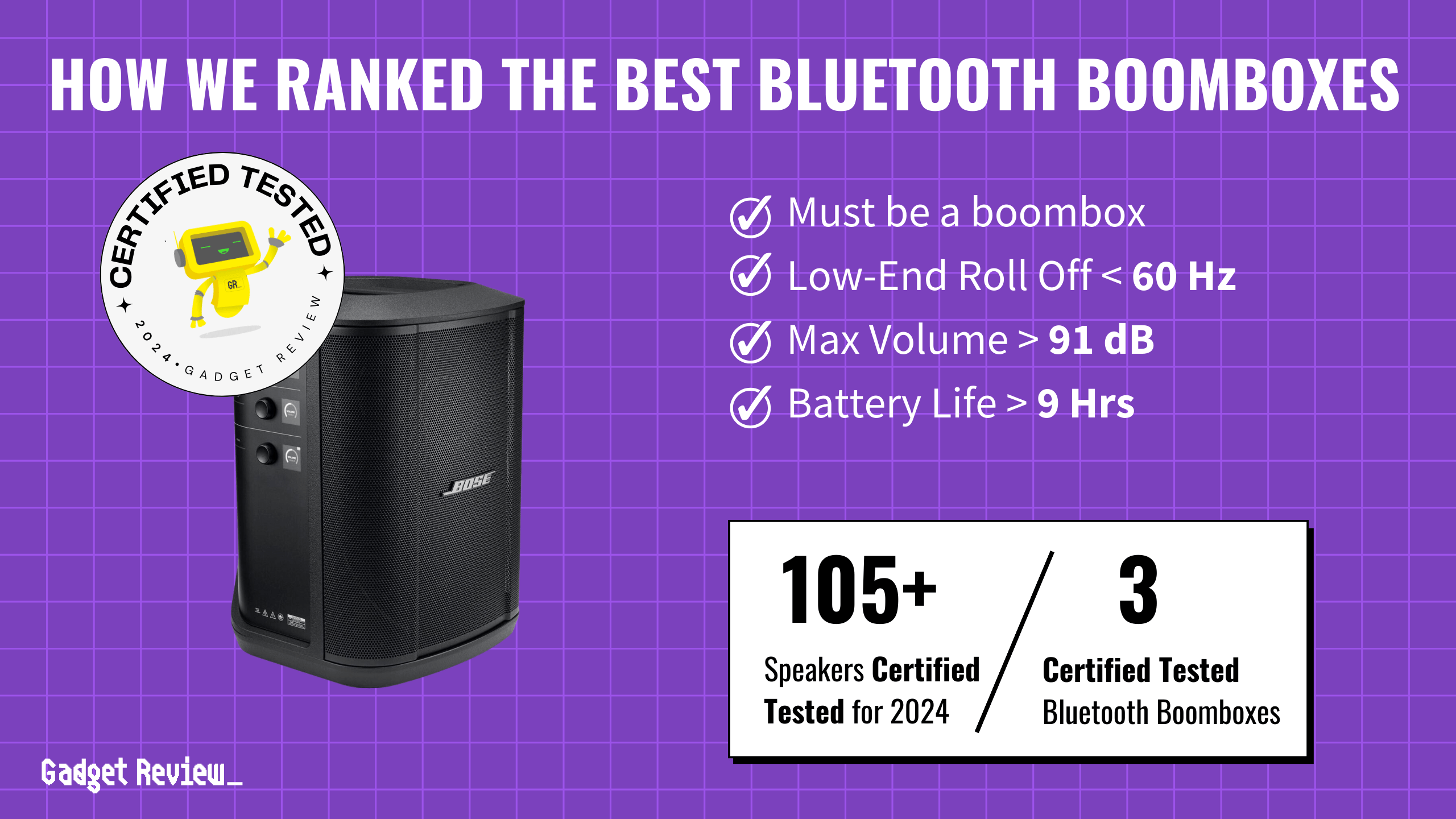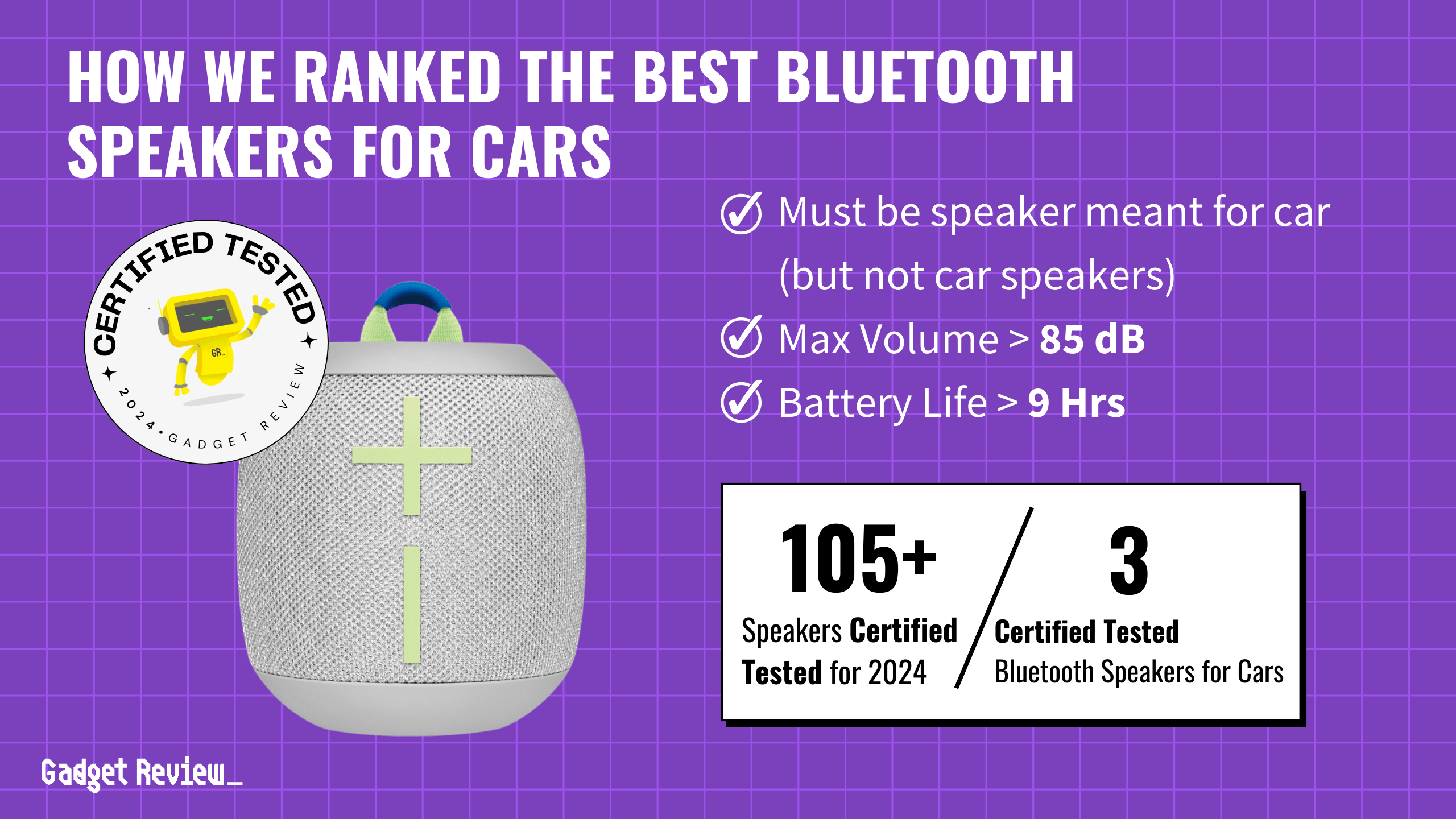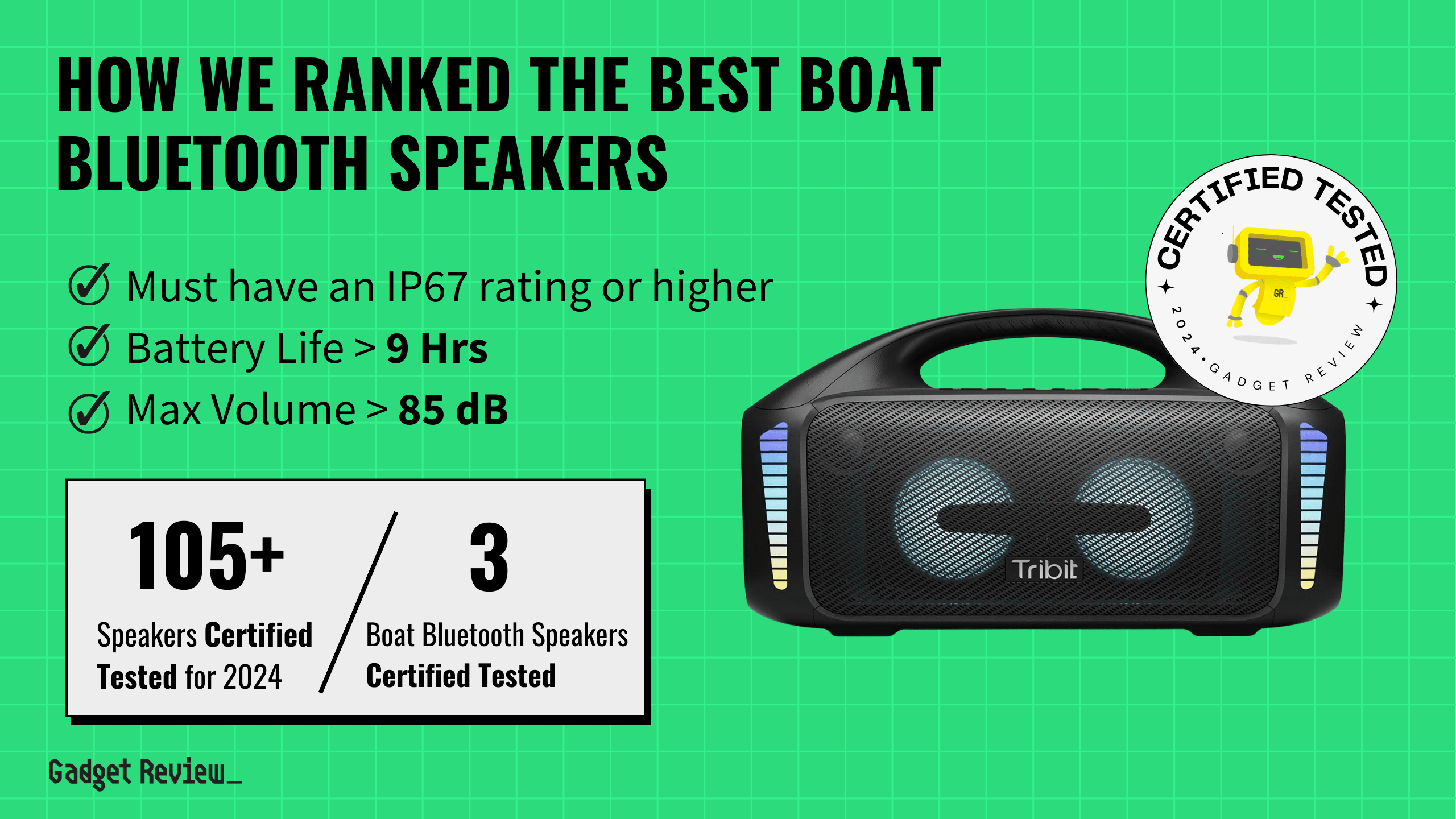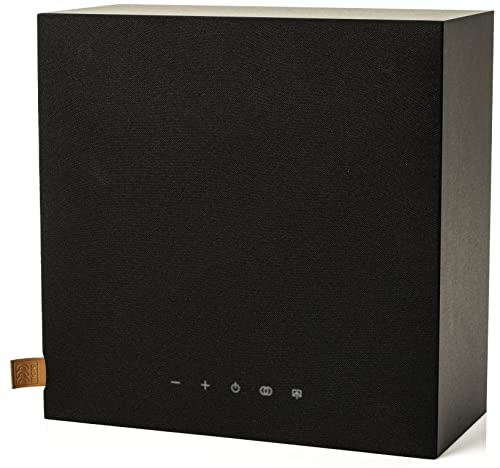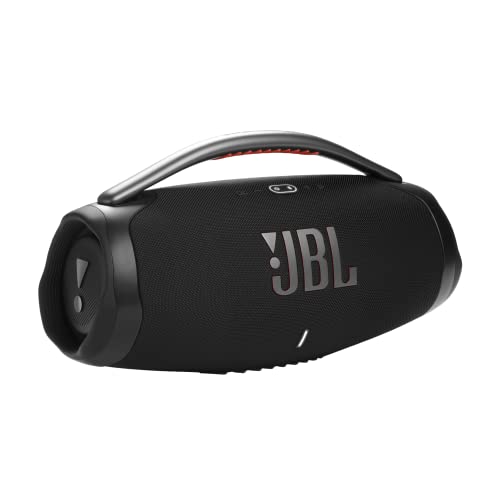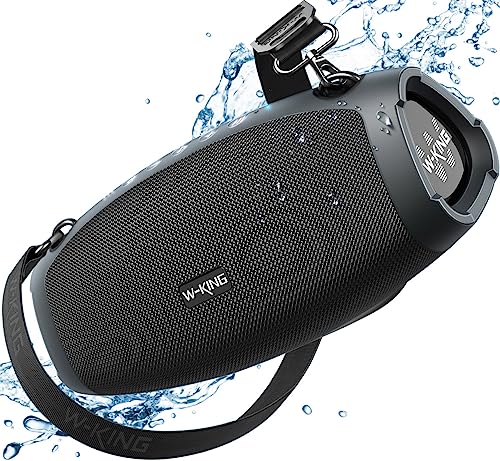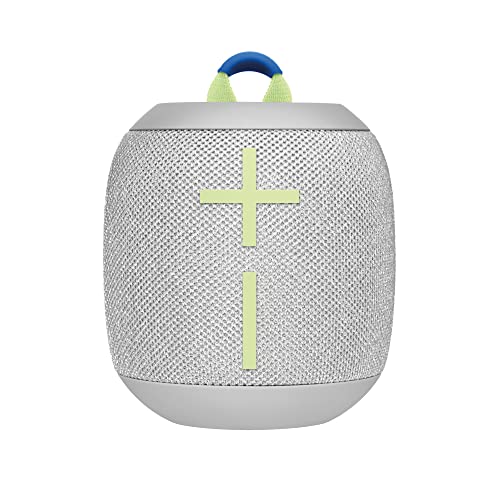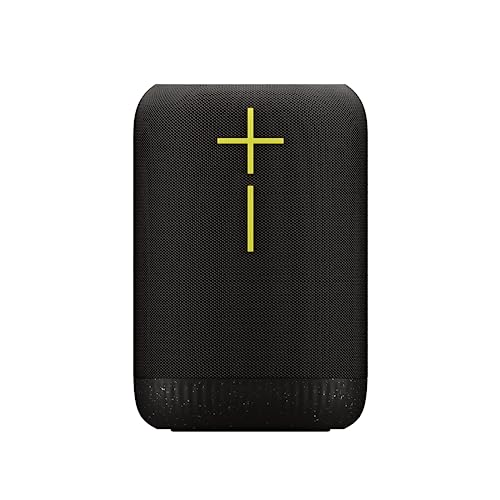The best bookshelf speakers offer quality sound in a smaller package. They’re also offered at a more affordable price than larger loudspeakers and they’re great for anyone who’s limited on space but wants to beef up the sound on their sound system, computer, or home theater system.
These are some of the best speakers because they come in a wide range of shapes, sizes, designs, and finish options, so they’re right for just about everyone. They’re also very easy to set up, so you don’t have to be a tech guru to get the best sound.
Keep reading this buying guide to learn more about the best bookshelf speakers.
Top Bookshelf Speakers
#1 Edifier R1280 Powered Bookshelf Speakers
Award: TOP PICK
WHY WE LIKE IT: It looks good thanks to its wood veneer finish and comes with remote control for convenient operation. It is capable of good bass levels and has a dual RCA input.
- Has bass, treble, and volume control knobs on its right speaker
- Wood veneer finish that makes it uniquely attractive
- Comes with a remote control
- No wireless connectivity
The Edifier R1280T is an excellent option for anyone looking for a set with a wood finish. The speakers deliver studio monitor sound quality and come with a convenient remote control that allows owners to set it to mute and control volume from the comfort of a seat. Owners can walk up to the right speaker whenever the remote is not at hand and make changes to the volume, bass, or treble through the three knobs found on its side. As far as connectivity is concerned, the R1280T also features dual RCA inputs, but unfortunately, the speaker has no wireless connectivity.
Designwise, the R1280 stands out with its wood veneer paneling on the sides and removable gray grilles on its front. Once removed, owners will spot a 4-inch woofer, a 13mm silk dome tweeter, and a port that functions to allow air movement and, in turn, facilitate better sound reproduction. In terms of sound quality, the speakers can deliver a robust bass response even at high volumes, but overall, its sound is pretty neutral.
#2 Sony SSCS5 3-Way 3-Driver Bookshelf Speaker
Award: HONORABLE MENTION
WHY WE LIKE IT: It has a wide frequency response range because it comes with three drivers instead of two. The extra driver (which is a super tweeter) has it delivers excellent vocals.
- Great for vocals
- Decent sensitivity rating
- Compact size and small footprint
- Requires an external power source
The Sony SSCS5 is a set of two premium-looking bookshelf speakers that deliver high-resolution sound, with a particular emphasis on vocals. Weighing about 9.4 pounds, they aren’t that difficult to handle, and because of their small footprint, they won’t take up too much space. Unfortunately, these are passive speakers, and therefore they require an external source of power such as an amplifier.
These speakers have an impedance of 6 ohms and an impressive frequency response range of 53 Hz to 50kHz. They deliver a clear and accurate sound without any exaggerated bass or treble. They have a sensitivity of 86.2 dB and come with three drivers instead of two. This is because it is composed of a woofer, tweeter, and super tweeter, which works to extend its frequency response.
#3 Klipsch Synergy Black Label B-100 Bookshelf Speaker
Award: BEST FOR SURROUND SOUND SYSTEMS
WHY WE LIKE IT: They are perfect for users who want to use them as an addition to their surround sound systems, and they are also slightly louder than most thanks to a slightly higher 90dB sensitivity rating.
- Tractrix Horn technology for wider soundstage, and lifelike sound
- Slightly higher 90dB sensitivity rating
- Wide frequency response range
- Buyers might have to add a subwoofer
The Klipsch Synergy B-100 speakers are a pair of good-looking speakers that can be used as front speakers or placed on a tight bookshelf. They rely on proprietary Tractrix Horn Technology, making it possible for users to place them anywhere without compromising sound quality or audibility. The technology also has them produce precise, lifelike sound and significantly minimize distortion even at high volumes.
These B-100 speakers have a frequency response range of 64Hz to 23kHz, and a power handling capacity of up to 50 Watts which stretches to 200 Watts at peak. They also have a sensitivity rating of about 90dB, which means they are just slightly louder than most other bookshelf speakers on the market. In terms of dimensions, both speakers are about 9.75 inches tall and 5.88 inches wide.
Although, for an even smaller, thinner device with just as much power, you’ll want to compare bookshelf speakers against soundbars. This reason is that soundbars tend to be great center channel speakers, and they can be very easy to set up.
#4 Polk Audio TSi200 Bookshelf Speakers
Award: BEST FOR WELL ROUNDED SOUND
WHY WE LIKE IT: The speakers are very well-calibrated and can deliver a well-rounded sound. They are also of excellent build quality.
- Well rounded sound
- Great build quality
- Silk tweeter for clear highs
- 17 pound weight might be too heavy for some to deal with
These Polk Audio TSi200 speakers look quite attractive for anyone who is a fan of dark and subtle colors, thanks to their black, washed-wood finish. The front grille is removable, and since each unit stands at 15.4 inches, buyers might need a good amount of space for easy placement. The speakers have a silk tweeter that has them produce clear highs, and with a sensitivity rating of 89dB, it is right around what most people should expect from a bookshelf speaker within its range. Still, their 17-pound weight might be too difficult for some to handle.
The speakers can produce a satisfyingly wide soundstage, and their excellent build quality will ensure that they stay in good condition for long periods. The speakers are capable of a frequency response of 50Hz to 24kHz and produce very clear and immersive vocals. It also delivers punchy bass and rich mids for a well-rounded sound.
#5 Moukey M20-3 Passive Bookshelf Speakers
Award: BEST FOR WALL MOUNTING
WHY WE LIKE IT: It has three drivers, which means it can produce detailed sound. Each speaker also has some hooks on the rear for easy wall mounting.
- Has three drivers for detailed sound
- Wall mountable
- Housed in a handmade wooden enclosure
- Will have to be connected to an amplifier as a power source
The Moukey 3-way Bookshelf Speakers are a solid pick for anyone who prioritizes being able to capture and relay fine sound details, thanks to its wide frequency response of 20Hz to 20kHz. The speakers are housed in a handmade wooden enclosure, and since they are wall mountable, users are free to pick exactly where they want to place them. The speakers each have three drivers: a 5-inch bass driver, a 2-inch mid, and a 1-inch treble. Its front grille is also removable, however, they are passive speakers, and as such, they will have to be connected to an amplifier as a power source.
In terms of sound quality, these speakers have a great bass response, and since they also have five binding posts, users will be able to enjoy a wide range of safe wiring options. Also, since the speakers need to be connected to an amplifier, owners will be able to plug in a microphone and enjoy karaoke.
#6 Triangle Borea BR03 Hi-Fi Bookshelf Speakers
Award: BEST FOR DETAILED SOUND
WHY WE LIKE IT: They can produce a very detailed sound that remains pretty clear even at high volume. They are also available in five different colors and are very well designed.
- Very detailed sound production
- Solid build quality
- Available in up to five color choices
- Requires intricate placement for best performance
The Triangle Borea NBR03 is a pair of contemporary-looking speakers that deliver exquisite sound detail. The manufacturer offered a bit of insight regarding placement, where they advised that buyers would be better off maintaining a minimum distance of 2m between speakers and placing them at least 40cm-50cm away from a back and side wall for best performance. Their build quality is pretty solid, and with an impressive frequency response of 46Hz to 22kHz, they are very well capable of accurately reproducing a wide range of sounds. Still, some may not appreciate that they have to be positioned in a particular manner for best performance.
The speakers have a sensitivity rating of 90dB and a decent 8-ohm impedance that is pretty standard for speakers of this size. They can produce a decent amount of bass when handling low frequencies, and thanks to a 25cm silk dome tweeter, high frequencies sound pretty good and accurate. The speakers are also available in up to five different color choices and have a magnetized grille that is very easy to remove.
Beginner’s Guide to the Best Bookshelf Speakers
What are Bookshelf Speakers?
Bookshelf models are a type of loudspeaker that is designed to be placed on or near a bookshelf. They are typically much smaller than even the top floor-standing speakers and often have a more traditional appearance.
The term “bookshelf speaker” can be somewhat misleading, as it implies that the speaker must be placed on an actual bookshelf. In reality, there is no specific requirement that the speaker is placed on or near a bookshelf. You can put powered bookshelf speakers anywhere they make sense for you, like on top of a computer desk or the fireplace mantel.
Bookshelf speakers typically have two drivers: a tweeter and a woofer. The tweeter is responsible for producing high-frequency sound, while the woofer is responsible for producing low-frequency sound. Some bookshelf speakers also include a midrange driver, which is responsible for producing sound in the middle of the frequency spectrum.
Bookshelf Speakers vs Traditional Speakers
There are several key differences between bookshelf speakers and traditional loudspeakers.
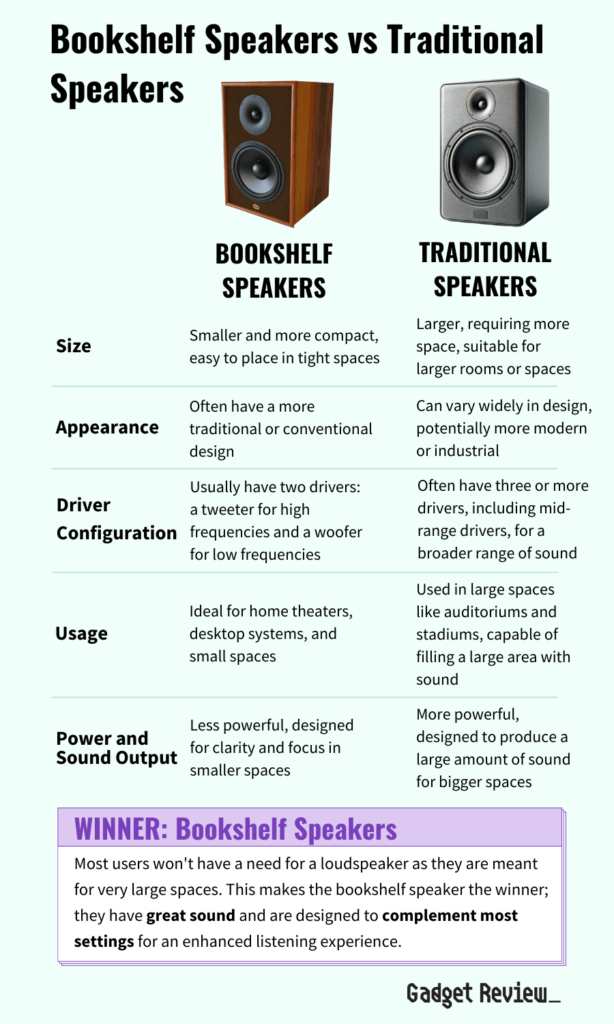
| Feature | Bookshelf Speakers | Traditional Loudspeakers |
|---|---|---|
| Size | Smaller and more compact, easy to place in tight spaces | Larger, requiring more space, suitable for larger rooms or spaces |
| Appearance | Often have a more traditional or conventional design | Can vary widely in design, potentially more modern or industrial |
| Driver Configuration | Usually have two drivers: a tweeter for high frequencies and a woofer for low frequencies | Often have three or more drivers, including mid-range drivers, for a broader range of sound |
| Usage | Ideal for home theaters, desktop systems, and small spaces | Used in large spaces like auditoriums and stadiums, capable of filling a large area with sound |
| Power and Sound Output | Less powerful, designed for clarity and focus in smaller spaces | More powerful, designed to produce a large amount of sound for bigger spaces |
| Suitability | Great for improving home audio quality, perfect for small spaces, and part of multi-channel audio systems | Best for large spaces needing significant sound coverage, not ideal for small, confined areas |
| Portability and Setup | Compact and easy to set up, some models are portable | Less portable due to size and weight, potentially more complex setup |
| Compatibility | Compatible with a wide range of audio devices but check compatibility before purchase | Generally compatible with professional or large-scale audio systems, may require specific setups |
| Features | May lack advanced features like built-in amplifiers or auxiliary inputs | Often equipped with more features and connectivity options due to their professional usage |
Bookshelf speakers are typically much smaller than traditional loudspeakers. This can be both a good and a bad thing. On the one hand, bookshelf speakers are more compact and often easier to place in tight spaces. On the other hand, bookshelf speakers may not be capable of producing as much audio quality as traditional loudspeakers.
Their appearance is also very different. Bookshelf speakers often have a more traditional appearance than traditional loudspeakers. This can be good or bad, depending on your preferences.
The price varies when looking at bookshelf speakers. Bookshelf speakers are typically less expensive than traditional loudspeakers. That’s because bookshelf speakers don’t require a large enclosure and don’t have to use as much power to produce sound.
The driver configuration of bookshelf speakers is a bit different than traditional speakers. Bookshelf speakers typically have two drivers: a tweeter and a woofer. This is in contrast to traditional loudspeakers, which often have three or more drivers.
Bookshelf speakers are commonly used in home theaters and desktop computer systems. They can also be used as part of a multi-channel audio system. That’s because bookshelf speakers are designed to produce a clear, focused sound and can be hidden away to provide a better home theater experience.
Traditional loudspeakers are often used in large spaces, such as auditoriums and stadiums. They are capable of producing a great deal of sound and are perfect for filling a large space with music or speech.
In general, bookshelf speakers are not as powerful as traditional loudspeakers. This is because bookshelf speakers are designed to be used in smaller spaces, while traditional loudspeakers are designed for larger spaces.
How Bookshelf Speakers Work
Bookshelf speakers work by converting electrical signals into sound waves.
The process begins with the amplifier, which takes the electrical signal and amplifies it. The amplified signal is then sent to the speaker, where it causes the speaker driver to vibrate. This vibration creates sound waves, which are heard by the listener.
There are two types of speaker drivers: pistonic and radiative. Pistonic drivers are cone-shaped and vibrate up and down to create sound waves. Radiative drivers are disk-shaped and vibrate side to side to create sound waves.
Most bookshelf speakers use a combination of pistonic and radiative drivers. The tweeter is usually a pistonic driver, while the woofer is usually a radiative driver. This combination allows for a wider range of sound to be produced.
The speaker enclosure also plays a role in how the speaker works. The enclosure helps to direct the sound waves and prevent them from being reflected off of walls or other surfaces. This helps to create a more focused sound.
Why Should You Buy a Bookshelf Speaker?
If you don’t already have bookshelf speakers, they may be a good investment in your home audio or home theater system. If you do already have some, it may be time to enhance your sound system with a few more or upgrade yours entirely.
Are Bookshelf Speakers Worth Buying?
- They improve the audio quality of your home audio system: If you’re looking for an easy way to improve the audio quality of your home audio system, bookshelf speakers are a good option. They’re relatively affordable and can provide a clear, natural sound with a great frequency range.
- They’re perfect for small spaces: If you don’t have a lot of space to work with, bookshelf speakers are a good option. They’re compact speakers designed to be used in smaller spaces and can easily be hidden away when not in use.
- They can be used for home theaters: If you’re looking to set up a home theater, bookshelf speakers are a must. They provide a better listening experience than traditional loudspeakers and can be used as part of a multi-channel audio system.
- They come in a variety of sizes and shapes: If you’re looking for something specific, bookshelf speakers likely come in a variety of sizes and shapes to fit your needs. You can find a compact speaker set for a desktop computer or speakers large enough to be used as part of a home theater system.
- They’re easy to set up: Bookshelf speakers are typically very easy to set up. You don’t need a lot of experience or equipment to get them up and running. It’s also easy to hide the speaker wire on the finest powered speakers, which most audio enthusiasts require, second to detailed sound.
- They can be used with a variety of audio devices: Most bookshelf speakers are compatible with a wide range of audio devices, including computers, televisions, and portable audio players.
- They’re affordable speakers: Bookshelf speakers are typically more affordable than traditional loudspeakers. This makes them a great option for those looking for budget speakers because they’re not the most expensive speakers, but they still offer a decent sound.
Why Bookshelf Speakers Might Not be for You
- They’re not as powerful as traditional loudspeakers: As mentioned earlier, bookshelf speakers are not as powerful as traditional loudspeakers. If you’re looking for a speaker that can handle large spaces or provide a lot of bass response, bookshelf speakers may not be for you. If you’re playing bass-heavy music, you may want to look for a speaker that offers a better balance of bass and treble frequencies.
- They don’t offer a lot of features: Bookshelf speakers typically don’t offer a lot of features, such as built-in amplifiers or auxiliary inputs. This may be a downside for some users.
- They may not be compatible with your audio device: Not all bookshelf speakers are compatible with all audio devices. Before you buy, make sure to check that the speaker is compatible with the device you plan to use.
- They’re not always portable: Although most bookshelf speakers are designed to be portable, some are not. Make sure you know the weight and size of the speaker before you buy it to ensure that it will be easy to move around.
- They may not be the best option for everyone: As with any type of speaker, bookshelf speakers may not be the best option for everyone. Before you buy, make sure to consider your needs and budget to see if they’re the right fit for you.
How Long Will a Bookshelf Speaker Last?
Bookshelf speakers are designed to last for up to 10 years with regular use. With proper care and use, they should provide many hours of listening enjoyment and audio quality. However, like any other electronic device, they may eventually need to be replaced if they experience too much wear and tear.
The most likely wear and tear on a bookshelf speaker is the driver. The drivers are the speakers that produce the sound and, over time, they may eventually wear out. If this happens, the speaker will need to be replaced.
In general, bookshelf speaker sets are a durable and long-lasting option for those looking to improve their home audio system. With proper care and use, they should last for many years.
How to Choose a Bookshelf Speaker
If you’re looking for your next bookshelf speaker, there are some things to consider. First, look for a speaker that is compatible with the devices you plan to use it with. This includes computers, televisions, and portable audio players.
Next, consider your budget. Bookshelf speakers come in a variety of prices, so you can find one that fits your needs.
You may also want to think about design or style. Not all bookshelf speakers are created equal, so you may want to find one that suits your style.
Finally, think about your listening needs. Do you need a speaker that is powerful enough to fill a large space? Or do you need one that is small and portable? Consider the features that are important to you and find a speaker that meets your needs.
Best Bookshelf Speaker Key Factors
1. Do I need to worry about compatibility?
As with many types of electronic devices, a bookshelf speaker will be compatible with many other types of components, but it may not be compatible with all brands or connections. It’s important to do your research to make sure the speaker you choose will be compatible with the devices you plan to use it with.
Some bookshelf speakers are wireless so you can tuck them away easily and hook them up via Bluetooth. A powered speaker has wires that need to be hidden away and hooked up to your other components. You may also be able to find speaker sets with remote control for easier interaction.
2. Should I consider my budget for a bookshelf speaker?
Bookshelf speaker sets come in a variety of prices, so there’s definitely one that will fit into your budget. Be sure to consider what features you want in a speaker, as well as the price.
With any purchasing decision, you’ll want to evaluate how much you’re willing to spend and then find products in that price range that offer most of the features and usability you need. If you can spring for something more expensive, you might want to check out the best Bose speakers.
3. Should I worry about my style preference?
Not all bookshelf speakers are created equal and you may want to find one that suits your personal style. There are a variety of colors, shapes, and sizes to choose from so you can find the perfect one for you.
You’ll find shapes like rectangles, cylinders, and triangular. In addition, many speakers come in different colors like black, white, wood grain, or silver. So if you’re particular about style, you’ll definitely want to consider your preferences when shopping for a bookshelf speaker.
4. What are the most important features to consider when purchasing a bookshelf speaker?
When purchasing a bookshelf speaker, there are a few key features to consider. The most important features vary depending on the individual, so make sure to think about what is important to you.
Some people may want a powerful speaker that can fill a large space, while others may need a small, portable speaker for travel. Others still may prioritize design and style.
In most home theater rooms, you’ll want to consider sound quality over almost anything else. However, if you’re just looking for a basic speaker to use in your bedroom or office, then you may not need to spend as much on sound quality.
It’s also important to evaluate whether you want a pair of bookshelf speakers, because generally speaking, a pair of speakers offer a more balanced sound and dynamic range. Bookshelf speaker sets are typically sold in pairs rather than one at a time.
You’ll also want to look for additional inputs like a USB input. A Bluetooth bookshelf speaker is also a great option for those who want tonal balance and superb audio quality when connecting their smart devices. This gives you versatile, good-sounding speakers when you’re simply using your phone to play music. You can also connect a Bluetooth speaker to a PC for when you aren’t on the go.
No matter what your needs are, there is a bookshelf speaker on the market that will fit your needs. Be sure to consider the technology that is most important to you when shopping for a speaker, especially if you’re picking up the Ultimate Ears Hyperboom.






